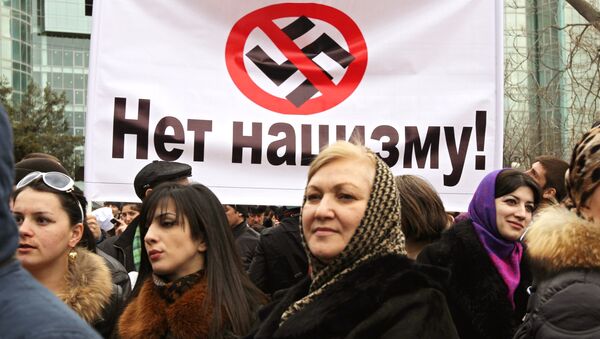MOSCOW, November 16 (Sputnik) — The International Day for Tolerance is observed on November 16 every year.
On that day in 1995 UNESCO adopted the Declaration of Principles and Follow-up Plan of Action for the United Nations Year for Tolerance. In 1996, the UN General Assembly invited UN Member States to observe the International Day for Tolerance on November 16, with activities directed towards both educational establishments and the wider public.
The declaration proclaims that while people may be different, they are equal in their dignity and rights.
"Tolerance is respect, acceptance and appreciation of the rich diversity of our world's cultures, our forms of expression and ways of being human," the declaration states.
"Tolerance at the State level requires just and impartial legislation, law enforcement and judicial and administrative process. It also requires that economic and social opportunities be made available to each person without any discrimination," the declaration says.
"Education is the most effective means of preventing intolerance. The first step in tolerance education is to teach people what their shared rights and freedoms are, so that they may be respected, and to promote the will to protect those of others," the declaration adds.
The principles of tolerance, as well as fundamental rights and freedoms, are sealed in legal acts and proclaimed in international declarations. The basic documents are as follows: the Universal Declaration of Human Rights, the International Covenant on Civil and Political Rights, and the International Covenant on Economic, Social and Cultural Rights. The European Convention for the Protection of Human Rights and Fundamental Freedoms covers the member states of the Council of Europe. The unacceptability of racism and racial discrimination is proclaimed by the Convention on the Elimination of all Forms of Racial Discrimination; the Convention on the Prevention and Punishment of the Crime of Genocide; and the Declaration on the Rights of Persons Belonging to National or Ethnic, Religious and Linguistic Minorities, to name a few.
In the Russian Federation, the Constitution is the main document providing a broad definition of tolerance. Article 136 (Violation of the equality of rights and freedoms of man) and Article 282 (Instigation of hatred or enmity and humiliation of human dignity) of the Criminal Code are the main documents for combating racism and racial discrimination.
The European Council on Tolerance and Reconciliation (ECTR) was established in Paris on October 7, 2008 to monitor tolerance in Europe. It develops practical recommendations for governments and international organizations on improving interreligious and interethnic relations on the continent. The Council is focused on fighting xenophobia, anti-Semitism and racial discrimination in the world.
In December 2008, the European Commission began drafting a law that prohibited any form of discrimination, racism and anti-Semitism, which EU countries were obliged to adopt in their legal systems.
In October 2012, ECTR submitted to the European Parliament a draft framework national statute on promoting tolerance, which defines the main principles and ideas of tolerance and the principles of relations between different social groups, including migrants and the local population; guarantees a number of democratic freedoms; lists the responsibilities of national governments, including those in education; and regulates relations with the media.
The ECTR established the European Medal of Tolerance to honor extraordinary achievements in the promotion of tolerance and the fight against all forms of intolerance. The first medal was conferred on the then King of Spain Juan Carlos in October 2010. Croatian President Ivo Josipovic and former Serbian President Boris Tadic received their medals in the European Parliament in October 2012 for their significant contributions to reconciliation in the Balkans.
The UNESCO-Madanjeet Singh Prize for the Promotion of Tolerance and Non-Violence rewards significant activities in the promotion of a spirit of tolerance and non-violence. Singh was an Indian artist, writer, diplomat and UNESCO Goodwill Ambassador. The $100,000 prize was instituted in 1995 and is awarded every two years. In 2014, it was won by human rights activists Ibrahim Ag Idbaltanat (Mali) and Francisco Javier Estevez Valencia (Chile).




